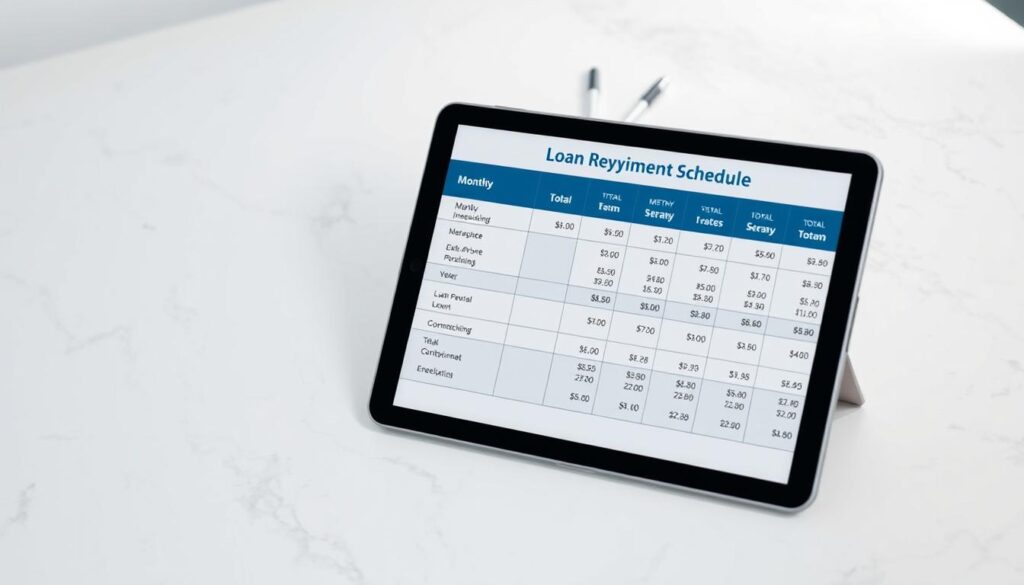
What are the key things to think about before taking a loan? It’s important to understand the top 5 factors. This helps you make a choice that fits your financial goals.
First, look at your financial situation. This includes your income, expenses, and any debt you already have. By doing this, you can figure out how much you can safely borrow. It’s all about making a smart choice.
Key Takeaways
- Assess your financial health before borrowing
- Understand the different types of loans available
- Be aware of the interest rates and repayment terms
- Evaluate your income, expenses, and existing debt
- Consider the top 5 factors to consider before taking a loan for informed decision-making
Understanding Your Financial Health Before Borrowing
Before you borrow money, it’s key to check your financial health. Look at your income, debt, and credit score. These help figure out how much you can pay back each month.
Your current income is very important when getting a loan. You need to know your debt-to-income ratio. A high ratio might mean higher interest rates or even loan rejection.
Assessing Your Current Income
Start by looking at your income. List your monthly income and expenses. This shows how much you can pay back each month. It helps you avoid too much debt and manage your loan payments.
Evaluating Your Existing Debt
It’s also important to check your current debt. List all your debts, like credit cards and loans. This helps you understand your debt-to-income ratio. It guides your decisions about borrowing money.
By looking at these key factors, you can make smart financial choices. Understanding your financial health is crucial before borrowing. Evaluating these factors helps you reach your financial goals without too much debt.
The Critical Role of Interest Rates in Loan Selection
Interest rates are key when picking a loan. They affect how much you’ll pay in total. Knowing about fixed and variable rates helps you pick the right loan for you.
When looking at interest rates, consider these points:
- Fixed rates are steady and predictable.
- Variable rates can change and offer flexibility.
- How rates affect your monthly payments and the loan’s total cost.
It’s essential to think about these factors. They help you choose a loan that fits your financial goals. This way, you make a smart choice for your future.
Understanding interest rates is vital for smart loan choices. By carefully looking at your options, you can find a loan that suits your financial needs. This helps you reach your long-term financial goals.
Comparing Different Types of Loans Available

When looking at loan options, several key factors come into play. These include interest rates, repayment terms, and whether collateral is needed. Knowing about the different types of loans can help borrowers make choices that fit their financial plans.
Some important loan options to think about are:
- Secured loans, which require collateral and often have lower interest rates
- Unsecured loans, which don’t need collateral but might have higher interest rates
- Fixed interest rate loans, which offer stable rates and predictable payments
- Variable interest rate loans, which may start with lower rates but could increase over time
Borrowers should also look at traditional vs. alternative lending. Traditional lenders, like banks, offer competitive rates and established processes. On the other hand, alternative lenders, such as online lenders, might have more flexible criteria but higher rates. By weighing these factors, borrowers can pick the right loan for their needs.
Loan choices should be based on a borrower’s financial situation and goals. By researching and comparing different loans, borrowers can make smart decisions. This helps them reach their financial goals.
Top 5 Factors to Consider Before Taking a Loan: A Comprehensive Analysis
Before you take a loan, it’s key to check your financial health. Look at the types of loans out there, interest rates, and repayment terms. Also, think about your long-term financial goals. This helps you make a smart choice that meets your current needs and future plans.
Understanding the top 5 factors to consider before taking a loan is crucial. This includes checking your income, debt, and credit score. Also, consider the interest rates and repayment terms. Following loan assessment guidelines can guide you through this process.
Some key things to think about are:
- Can you afford to repay the loan?
- What’s the total cost of the loan, including interest and fees?
- How will the loan affect your long-term financial goals?
By carefully looking at these factors and following loan assessment guidelines, you can make a wise choice. Remember, taking a loan is a big financial step. It’s important to be cautious and think carefully about the top 5 factors to consider before taking a loan.
Evaluating Loan Terms and Repayment Schedules

When you’re thinking about getting a loan, it’s key to look at a few important things first. You need to check the interest rates, repayment terms, and any fees. This helps you make a choice that fits your financial plans.
Another important thing is the repayment schedule. This tells you how often you’ll make payments, like every month. Knowing this helps you plan your money better. It’s also good to know if you can pay off the loan early and if there are any penalties for doing so.
Understanding Payment Frequency
How often you pay back the loan matters a lot. You should pick a payment schedule that fits your income and expenses. For example, if you get paid monthly, paying back the loan monthly might work best for you. But if your income is not steady, paying every two months or quarterly could be easier.
Early Repayment Options
If you want to pay off your loan fast, look for early repayment options. But, it’s important to know the rules around this. Some lenders might charge extra for paying early, while others might give you a discount. Always read the fine print to understand what happens if you pay off your loan early.
Default Consequences
Not paying back a loan on time can really hurt your credit score and lead to extra fees. It’s smart to know what could happen if you default. This way, you can avoid it by making a budget, saving for emergencies, and paying on time.
In short, looking at loan terms and repayment plans is a big part of getting a loan. By checking the important details and understanding the rules, you can choose wisely. Always read the loan agreement, know your repayment schedule, and plan well to avoid any problems.
| Loan Type | Interest Rate | Repayment Term |
|---|---|---|
| Personal Loan | 6-12% | 1-5 years |
| Car Loan | 4-10% | 2-7 years |
| Mortgage | 3-6% | 10-30 years |
Hidden Costs and Additional Fees to Watch For
When you’re thinking about getting a loan, it’s key to look at more than just the interest rate. Loans often have hidden costs and extra fees that can raise the total cost. These can include origination fees, late payment fees, and penalties for paying off the loan early. All these are factors impacting loan decisions.
To steer clear of surprise costs, it’s important to read the loan agreement carefully. If you’re not sure about any fees, don’t hesitate to ask. Here are some important things to keep in mind:
- Origination fees: These are fees charged by the lender for processing the loan.
- Late payment fees: These are fees charged when a payment is missed or late.
- Prepayment penalties: These are fees charged when a loan is paid off early.
Knowing about these fees can help you make a better choice. It’s also vital to think about the loan term, payment schedule, and other factors impacting loan decisions. These can affect your ability to pay back the loan.
By carefully checking the loan agreement and understanding all costs, you can avoid unexpected expenses. Always consider essential loan considerations and factors impacting loan decisions when looking at loan options.
Assessing Your Long-term Financial Goals
Thinking about a loan means looking at how it will affect your future money plans. Things like interest rates and how long you’ll pay back the loan are important. They can change how much you can save, invest, or reach other money goals. Looking at loan guidelines helps you decide if debt fits with your long-term plans.
When checking your long-term money goals, consider these:
- Investment opportunities: Will debt give you a better return than other chances, like school or starting a business?
- Emergency funds: Do you have enough money set aside for unexpected costs, or will debt risk your financial stability?
- Retirement savings: How will debt affect your retirement savings, and are there other ways to reach your long-term goals?
By looking at these points and loan guidelines, you can choose wisely about debt. Always put your long-term money goals first. Think about saving or investing instead of debt before you decide.
Assessing your long-term money goals is key when thinking about a loan. By carefully looking at your options and loan guidelines, you can make a choice that fits your financial plans. This choice will help you succeed in the long run.
| Loan Type | Interest Rate | Repayment Term |
|---|---|---|
| Personal Loan | 6-12% | 2-5 years |
| Business Loan | 5-10% | 3-7 years |
Understanding Loan Documentation Requirements
When you think about getting a loan, knowing what you need is key. You must have all the right documents ready. This includes your ID, proof of income, and any collateral needed.
It’s also important to read your loan agreement carefully. This way, you know what you’re agreeing to. Don’t make common mistakes like missing documents or filling out forms wrong. These can cause delays or even stop your loan from being approved.
Essential Paperwork Checklist
- Identification documents, such as a driver’s license or passport
- Income proof, including pay stubs or tax returns
- Collateral documents, if required, such as property deeds or vehicle titles
Common Application Mistakes to Avoid
To avoid problems, check your application twice. Make sure all forms are filled out right and you have all the documents needed.
Knowing what documents you need and avoiding common mistakes can make your loan application go smoothly. This is crucial for getting a loan and is one of the main things to consider before borrowing money.
“Want to make smarter loan decisions? Check out the Consumer Financial Protection Bureau (CFPB) for expert advice on borrowing, avoiding scams, and understanding loan terms. Stay informed and borrow wisely!”
Conclusion: Making an Informed Borrowing Decision
When you’re looking into loans, it’s key to make a choice that fits your factors to evaluate before loan approval and your loan decision-making criteria. Look at your financial health, know your loan options, and check the terms and repayment plans. This way, you can pick a loan that works for you without risking your money.
Getting a loan is a big deal, so think it over carefully. Stay up to date, ask questions, and get advice from financial experts if you need to. With the right approach and a good plan, you can make a loan choice that’s good for your money and helps you reach your goals.
Day trading means buying and selling stocks in one day to make quick profits. Long-term investing, however, is about keeping stocks for years or even decades. It aims to weather market ups and downs and enjoy long-term growth. So, which path is best for you? READ MORE ABOUT IT FROM HERE – Day Trading vs. Long-Term Investing: Which is Best for You?
Top 5 Factors to Consider Before Taking a Loan
:FAQ
What are the top factors to consider before taking a loan?
Before taking a loan, consider these key points: – Check your financial health, including income, expenses, and debt. – Learn about the different loan types, like secured and unsecured, and fixed and variable rates. – Understand how interest rates affect your monthly payments and the loan’s total cost. – Compare loan options to find the best fit for your financial situation and goals. – Look at the loan terms, including repayment schedules and early repayment options.
How can I assess my financial health before borrowing?
To check your financial health before borrowing, do the following: – Determine your monthly repayment capacity based on your income. – Calculate your debt-to-income ratio to see if you qualify for a loan. – Check your credit score, as it impacts your loan interest rate and approval chances.
How do interest rates impact the cost of a loan?
Interest rates are crucial in determining a loan’s cost. Different loans have different rates, fixed or variable. Knowing how these rates affect your payments and total loan cost is key to choosing the right loan.
What are the differences between secured and unsecured loans?
Secured loans need collateral, like a home or car, and often have lower rates. Unsecured loans don’t need collateral but may have higher rates. Your choice depends on your financial situation and borrowing needs.
What are some hidden costs and additional fees to watch for when taking a loan?
Loans can have hidden costs and fees, like origination fees and late payment fees. Always review the loan agreement to understand all costs involved. This helps you make an informed decision.
How should I evaluate my long-term financial goals when considering a loan?
When considering a loan, think about its impact on your future finances. Consider how it affects your ability to save, invest, or reach other financial goals. Weigh the debt against potential investments, like education or business ventures.
What are the essential documentation requirements for a loan application?
For a loan application, you’ll need identification, proof of income, and collateral documents (if needed). Knowing common application mistakes can help avoid delays or rejection.








1 thought on “Top 5 Factors to Consider Before Taking a Loan”